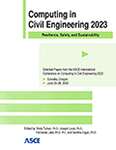An Interpretable Machine Learning Method to Inform Urban Adaptation to Heat Waves
Publication: Computing in Civil Engineering 2023
ABSTRACT
As the deadliest climate event over the past 30 years in the US, heat waves are projected to be more intense and dangerous under global warming. Cities, composed of unevenly distributed populations and diverse landscape, suffer from significant adverse impacts of heat waves with varying land surface temperatures across different areas. In addition to the climate, effective adaptation to heat waves also requires an understanding and evidence regarding how urban natural, physical, and social processes influence urban thermal variations. Prior studies that mostly rely on traditional regression methods fall short in interpreting the complex role of these factors in influencing fine-scale thermal variations within and even beyond the physical boundaries of these factors. To address this research gap, we propose an interpretable machine learning method based on graph neural network to disentangle the significant factors that influence local thermal conditions. Our model can explain 35.3% extra variations compared to the baseline ridge regression model. The results of the model can inform urban adaptation strategies, including nature-based solutions, such as evaluating the cooling efficiency of spatially variant greening interventions at fine-scale levels.
Get full access to this article
View all available purchase options and get full access to this chapter.
REFERENCES
Aboubakri, O., Khanjani, N., Jahani, Y., and Bakhtiari, B. (2019). Attributable risk of mortality associated with heat and heat waves: A time-series study in Kerman, Iran during 2005–2017. Journal of Thermal Biology, 82, 76–82. https://doi.org/10.1016/j.jtherbio.2019.03.013.
Balázs, B., Unger, J., Gál, T., Sümeghy, Z., Geiger, J., and Szegedi, S. (2009). Simulation of the mean urban heat island using 2D surface parameters: Empirical modelling, verification and extension. Meteorological Applications, 16(3), 275–287. https://doi.org/10.1002/met.116.
Bandala, E. R., Kebede, K., Jonsson, N., Murray, R., Green, D., Mejia, J. F., and Martinez-Austria, P. F. (2019). Extreme heat and mortality rates in Las Vegas, Nevada: Inter-annual variations and thresholds. International Journal of Environmental Science and Technology, 16(11), 7175–7186. https://doi.org/10.1007/s13762-019-02357-9.
Bokaie, M., Zarkesh, M. K., Arasteh, P. D., and Hosseini, A. (2016). Assessment of Urban Heat Island based on the relationship between land surface temperature and Land Use/ Land Cover in Tehran. Sustainable Cities and Society, 23, 94–104. https://doi.org/10.1016/j.scs.2016.03.009.
Fan, C., Xu, J., Natarajan, B. Y., and Mostafavi, A. (2023). Interpretable machine learning learns complex interactions of urban features to understand socio‐economic inequality. Computer-Aided Civil and Infrastructure Engineering, mice.12972. https://doi.org/10.1111/mice.12972.
Guo, A., Yang, J., Sun, W., Xiao, X., Xia Cecilia, J., Jin, C., and Li, X. (2020). Impact of urban morphology and landscape characteristics on spatiotemporal heterogeneity of land surface temperature. Sustainable Cities and Society, 63, 102443. https://doi.org/10.1016/j.scs.2020.102443.
Hamilton, W., Ying, Z., and Leskovec, J. (2017). Inductive Representation Learning on Large Graphs. Advances in Neural Information Processing Systems, 30, 11.
Heaviside, C., Macintyre, H., and Vardoulakis, S. (2017). The Urban Heat Island: Implications for Health in a Changing Environment. Current Environmental Health Reports, 4(3), 296–305. https://doi.org/10.1007/s40572-017-0150-3.
Heo, S., Bell, M. L., and Lee, J.-T. (2019). Comparison of health risks by heat wave definition: Applicability of wet-bulb globe temperature for heat wave criteria. Environmental Research, 168, 158–170. https://doi.org/10.1016/j.envres.2018.09.032.
Njoku, E. A., and Tenenbaum, D. E. (2022). Quantitative assessment of the relationship between land use/land cover (LULC), topographic elevation and land surface temperature (LST) in Ilorin, Nigeria. Remote Sensing Applications: Society and Environment, 27, 100780. https://doi.org/10.1016/j.rsase.2022.100780.
NOAA. (2022). Weather Related Fatality and Injury Statistics. https://www.weather.gov/hazstat/.
NOAA. (2023). Assessing the Global Climate in 2022. https://www.ncei.noaa.gov/news/global-climate-202212.
Schwaab, J., Meier, R., Mussetti, G., Seneviratne, S., Bürgi, C., and Davin, E. L. (2021). The role of urban trees in reducing land surface temperatures in European cities. Nature Communications, 12(1), 6763. https://doi.org/10.1038/s41467-021-26768-w.
Shahmohamadi, P., Che-Ani, A. I., Maulud, K. N. A., Tawil, N. M., and Abdullah, N. A. G. (2011). The Impact of Anthropogenic Heat on Formation of Urban Heat Island and Energy Consumption Balance. Urban Studies Research, 2011, 1–9. https://doi.org/10.1155/2011/497524.
Singh, V. K., Mughal, M. O., Martilli, A., Acero, J. A., Ivanchev, J., and Norford, L. K. (2022). Numerical analysis of the impact of anthropogenic emissions on the urban environment of Singapore. Science of The Total Environment, 806, 150534. https://doi.org/10.1016/j.scitotenv.2021.150534.
Sun, Y., Li, Y., Ma, R., Gao, C., and Wu, Y. (2022). Mapping urban socio-economic vulnerability related to heat risk: A grid-based assessment framework by combing the geospatial big data. Urban Climate, 43, 101169. https://doi.org/10.1016/j.uclim.2022.101169.
Wang, P., Ma, Y., Tang, J., Wu, D., Chen, H., Jin, Z., and Huo, Z. (2021). Spring Frost Damage to Tea Plants Can Be Identified with Daily Minimum Air Temperatures Estimated by MODIS Land Surface Temperature Products. Remote Sensing, 13(6), 1177. https://doi.org/10.3390/rs13061177.
WHO. (2022). Statement – Climate change is already killing us, but strong action now can prevent more deaths.
Zhou, D., Bonafoni, S., Zhang, L., and Wang, R. (2018). Remote sensing of the urban heat island effect in a highly populated urban agglomeration area in East China. Science of The Total Environment, 628–629, 415–429. https://doi.org/10.1016/j.scitotenv.2018.02.074.
Information & Authors
Information
Published In
History
Published online: Jan 25, 2024
ASCE Technical Topics:
- Analysis (by type)
- Artificial intelligence and machine learning
- Business management
- Climate change
- Climates
- Computer programming
- Computing in civil engineering
- Construction engineering
- Construction management
- Engineering fundamentals
- Engineering mechanics
- Environmental engineering
- Global warming
- Infrastructure
- Population projection
- Practice and Profession
- Project management
- Regression analysis
- Statistical analysis (by type)
- Sustainable development
- Thermal effects
- Thermodynamics
- Urban and regional development
- Urban areas
Authors
Metrics & Citations
Metrics
Citations
Download citation
If you have the appropriate software installed, you can download article citation data to the citation manager of your choice. Simply select your manager software from the list below and click Download.
